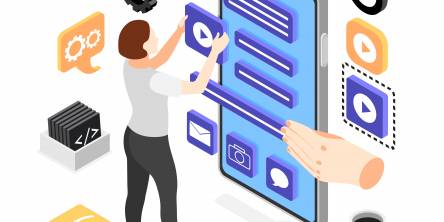10 Ways New Technology Has Revolutionized the Transport Industry

You might not think about it often, but the transport industry has been significantly revolutionized by technology over the past few years. From self-driving cars to drones, new technology makes it easier and faster to move goods and people around the country. Here are 10 ways that new technology has changed the global transport industry.
Improved Infrastructure
One of the crucial ways new technology has changed the transport industry is by improving infrastructure. Thanks to new technologies like sensors and GPS, it’s now easier than ever for transportation companies to track their vehicles and make sure they are operating efficiently. This has led to a decrease in traffic congestion and accidents and better management of resources.
Countries are also more interconnected thanks to advanced transport technology and improved infrastructure. As a result, more countries can now record an increase in trade and commerce and a more efficient global transport system.
Eco-Friendly Initiatives
Electric and hybrid cars are becoming more popular, and as a result, there is less pollution from transportation. This is good news for the environment and helps reduce costs associated with fuel. Additionally, new technologies are being developed to improve public transportation, making it more efficient and sustainable for everyone.
Data-Driven Decisions
Thanks to big data analytics, transportation companies can now make better decisions based on empirical evidence. This has led to improvements in traffic flow, fuel efficiency, and customer satisfaction. Additionally, new technologies, like smart ID scanner apps, have made it easier for transportation companies to collect and analyze driver and customer data, allowing them to make even more informed decisions in the future.
Faster Shipping Times
Another benefit of new technology is that it has helped speed up shipping times. Thanks to advances in communication and tracking, companies can now ship goods faster than ever before. This is good news for both companies and consumers, as it means that goods can be delivered faster and more efficiently. It also helps create a level playing field for all transportation companies, as those who embrace new technology will have a distinct advantage over their competitors.
Improved Safety
New technology has also made the transport industry much safer. Dash cameras and GPS tracking systems help to deter crime, as well as improve driver safety. In the event of an accident, these devices can collect evidence and help piece together what happened. This is invaluable for both insurance companies and the police, as it helps to create a clear picture of what happened.
Better Communication
In the past, communicating with a driver was often complicated and unreliable. However, new technology has changed this completely. Nowadays, there are many apps and devices that allow you to track a driver’s location in real-time and communicate with them directly. This is extremely useful for both businesses and drivers' families, as it allows them to keep track of their drivers and ensure they are safe.
Reduced Costs
One of the biggest benefits of new technology is that it has helped reduce costs for transport companies. For example, by using GPS tracking systems, businesses can save money on fuel costs by optimizing their routes accordingly. Furthermore, new apps and technologies have made it easier for transport companies to track their expenses, which has helped keep costs down.
On-Demand Transport Services
Thanks to new technology, people in large cities can now get to work, home, and other places faster and on-demand with the emergence of riding services like Uber and Lyft. These companies have disrupted the transport industry by providing an innovative solution to the age-old problem of urban transportation.
All you need is an app on your smartphone, and you can get a ride in minutes, which is far more convenient than waiting for a bus or train. What’s more, these services are often cheaper than most traditional transport options.
Additionally, people can share rides with others going in the same direction, which is more efficient and cost-effective than everyone driving their car. Ridesharing is not only good for your wallet, but it’s also good for the environment. By sharing rides, we can reduce traffic congestion and pollution.
Self-Driving Cars
One of the most exciting advancements in transport technology is the development of self-driving cars. With self-driving cars, we can eliminate the need for human drivers, dramatically reducing traffic fatalities.
Self-driving cars are also more efficient than traditional cars because they can optimize their routes and avoid rush hour traffic. In addition, self-driving cars can be used for deliveries, which will help to reduce delivery time and traffic pollution in urban areas.
Augmented Reality
With augmented reality technology, drivers can overlay information about the surrounding environment onto their view of the world. This can improve safety by providing drivers with real-time information about their surroundings and minimizing the likelihood of minor and major accidents occurring. AR gadgets will also help drivers with information about:
- Their delivery address
- The nature of products they're delivering
- Accurate information on the packing space they need at every step
- Instructions about products that require special care
With this information, drivers can rest assured they're equipped with the most up-to-date knowledge to make their trips as smooth as possible.
The transport industry has seen tremendous changes in recent years thanks to new technology. These changes have made the industry more efficient and safer for everyone involved.
Similar Articles
Discover how expert book printing solutions transform manuscripts into high-quality printed books. Learn about the process, materials, customization options, eco-friendly practices, and the future of modern book printing.
Architectural 3D rendering price guide covering costs, factors, AI impact, and typical pricing for residential and commercial exterior and interior renders.
Most large organisations already know how hard enterprise application testing can be. You’ve got old and new systems talking to each other, custom code layered on vendor platforms
When it comes to working at heights, safety and efficiency are paramount. Aerial work platforms (AWPs) have revolutionized how professionals approach elevated tasks across countless industries, from construction sites to warehouse operations.
The modern age of customers expect constant availability, no matter what the offer. And for that, the market requires rapid innovation cycles. In such a high stakes environment, technology infrastructure is more than just a cost center.
When evidence seals fail, cases weaken. Explore how compromised chain of custody can derail investigations and jeopardize justice.
Compare hydraulic and traction residential elevators to find the best fit for your home. Learn how each system works, their pros and cons, space needs, energy use, and maintenance requirements.
Extend the lifespan of your commercial marina docks with proactive maintenance. Learn essential inspection routines, material-specific care, and safety tips to protect your investment and ensure long-term dock performance.
Learn the key factors in designing an engineered fall protection system. Discover how hierarchy of controls, task analysis, structural integrity, and fall clearance ensure safety and compliance.









